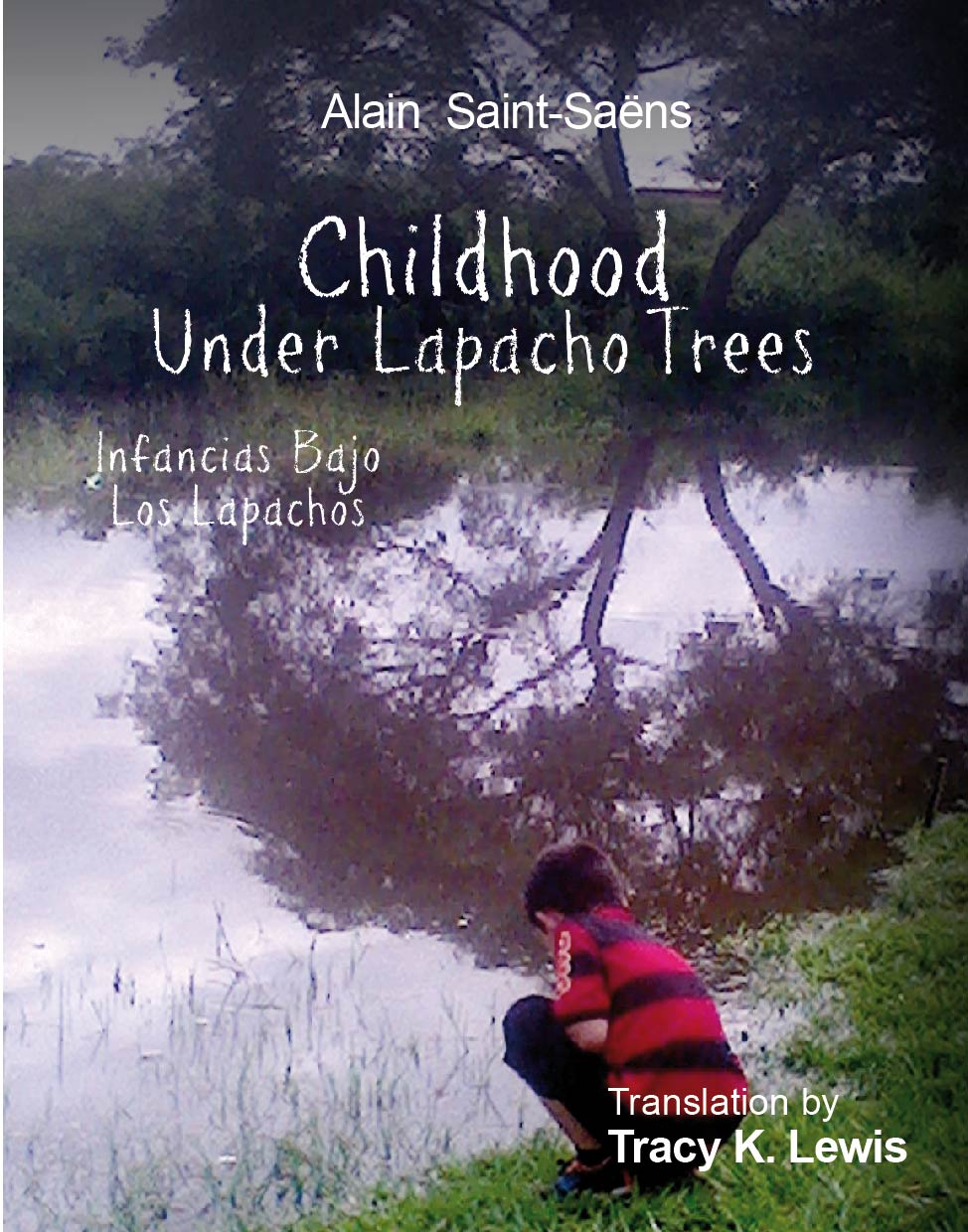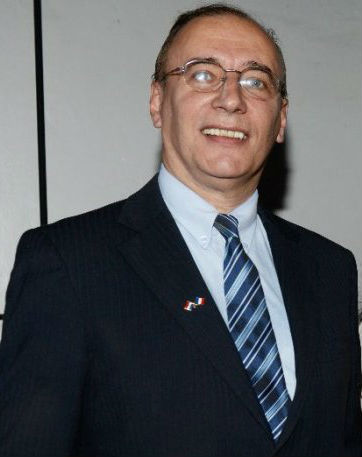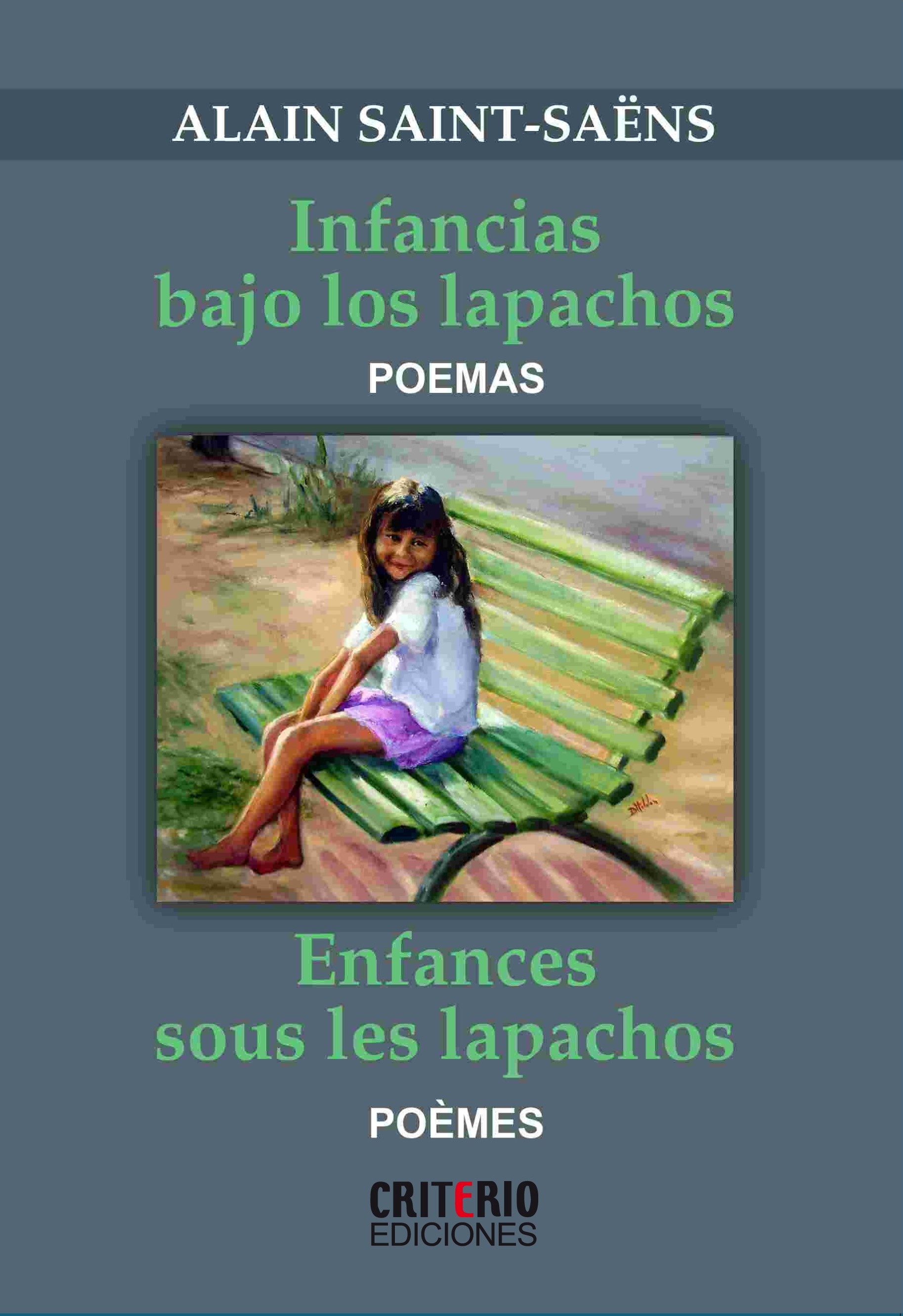|
 |

ALAIN
SAINT-SAËNS
Corresponding Member
of the Academy of Letters,
Bahia, Brazil
|
|
Front Cover Art Design:
ANA
MARÍA CALATAYUD |
ISBN: 978-1-937030-56-8 |
|
 |
'I have known Professor Tracy K. Lewis
for years. We have translated some same novels or books of poetry in
different languages. He is an excellent translator and a sound literary critic.
Furthermore, Professor Lewis is also a distinguished and renowned poet in three languages
(English; Spanish; and Guarani, the Paraguayan native language). I
deeply admire his wonderful poetry. Nobody better
than great American poet Tracy K. Lewis could have translated my poems with such a
noble heart and a divine touch of grace.'
Alain Saint-Saëns
|
|
ALAIN SAINT-SAËNS
DEDICATING COPIES OF
INFANCIAS BAJO LOS
LAPACHOS
AT THE ALLIANCE
FRANÇAISE
IN ASUNCION, PARAGUAY
DURING AN EVENT
SPONSORED BY
THE SWISS AMBASSY,
MARCH, 18, 2014. |
 |
|
 |
 |
|
RENÉE FERRER, THEN
PRESIDENT
OF THE PARAGUAYAN ACADEMY
WITH ALAIN SAINT-SAËNS,
MARCH 18, 2014 |
ALAIN SAINT-SAËNS WITH
ALEJANDRO GATTI, CRITERIO EDICIONES EDITOR. |
|
Translated from French and Spanish
First Edition
by American Poet
TRACY K. LEWIS
State University of New
York at Oswego, USA |
 |
 |
'Alain Saint-Saëns paints a dolorous picture of abused
children in this text, one which rings with truth and
poetically saves them from obscurity. This poet's
critique of the adults is savvy and relentless, while
these figures remain a force of power and desire that
weaves a web of helplessness around the vulnerable under
their control. The crimes are treated in a skillful way,
eliciting double meanings, as in "father/Father".
Alain Saint-Saëns'
images from Paraguay certainly resonate with scenes in
so many cities around the world, including Chicago.
The translation aptly conveys the spirit of the original
without restraining itself to a literal rendering.'
CYNTHIA T. HAHN
Poet and Professor of Romance Languages,
Lake Forest College, IL (USA)
|
|
|
|
LUNA NARANJA
Luna
naranja, noche mágica,
Luminosidad onírica,
Todo duerme, tiempo suspendido.
Furtiva y silenciosa,
La anaconda curiosa
Digiere un perro perdido.
Del verraco huraño
El deseo de la cerda
Arruina el sueño.
Ofendiendo la mirada,
El gordo sapo azorado
Osa un mohín lánguido.
Zinedín, mi niño,
Triunfando sale de un sueño,
Todo mojado de sudor.
Un gallo, en lo alejado,
Sobre sus espolones alzado,
Saluda el pálido resplandor.
|
ORANGE MOON
Orange
moon, wizard night,
Light of dream,
All’s asleep in pause of time.
Noiseless furtive anaconda
Darkly browsing
Casually digests an errant dog.
Lust for she-pig
Trumps the churlish boar’s
Intended sleep,
While wounding sight
A toad leers fatly
In its sluggish fright.
Zinédine my child
Exits sleep triumphant
Steeped in sweat,
And somewhere else, a rooster
Rises on his spurs
To crow the inchoate sun.
|
|
SOLDADITOS DE PLOMO
Acosta
Ñu, lugares malditos,
Tres mil quinientos soldaditos,
Hijos de Paraguay tan valiosos
Contra bárbaros odiosos
Lucharon como hombres,
Cayeron gentilhombres.
¡Qué nadie sobreviva al día!
¡Qué se mueran todos, sin misericordia!
El verdugo brasileño bajó los ojos
Cuando madres paraguayas gloriosas,
En los brazos sus sangrantes hijos,
Quemaron orgullosas y silenciosas.
De Brasil no hubo descargo,
El tiempo no trajo olvido.
A veces el viento sopla tanto
Que se escucha como un llanto.
Agosto dieciséis, sin embargo,
Regala el soldadito el oído.
|
LITTLE TIN SOLDIERS
Evil
battlefield, Acosta Ñu,
Three-thousand and a half of children,
Gallant sons of Paraguay it threw;
Against barbarity
Of full-grown men
They fell in manhood premature.
No quarter, kill them all!
Let your mercy die along with them!
So saying, gazed with sunken eye upon the pyre
The butcher from Brazil,
While Paraguayan mothers, brave and silent
Fed their children’s corpses to the fire.
No regrets came ever from Brazil,
No closure where the children bled,
No sound but dirges of the miming wind
Recalling spasms of the dead.
16 August, slaughter of the soldier-waifs
Who now in memory at least, are safe.
|
|
TRANSLATOR’S PREFACE
I’m doubtless not the first in pointing out
the fortuitous resemblance between the Spanish words traducción (translation) and
traición (betrayal),
nor in bringing to light what the second term reveals about
the first. Far from fostering a slavish copy of the
original, what the translator of literary texts does is to
alter them, to subvert them, and finally to “betray” them.
Beyond simply re-painting a house, the translator’s task is
to re-construct it with a new floor plan and a new
architectural style.
What’s more, this reconstruction is involuntary and
unavoidable; we are forced to betray the original
because replacing one language with another necessarily
means replacing the very materials of which the text is
made. Not even the simplest, most direct
substitutions—“tree” for “árbol” for example—can be exact
equivalences, since each word differs from the other in
spelling, in sound, in rhythm, and in the connotational aura
which surrounds it.
For Paraguayans, “árbol” is a subtropical
construct, exuberant with fruit and greenery, shadowed
perhaps with the Guarani sounds of ka’i and urutau,
whereas North Americans might visualize “tree” in the
magnificent garments of autumn, or in the melancholy
nakedness of winter. And if this is so for individual
words, what can we say of sentences, paragraphs, poems, or
entire novels?
When Alain Saint-Saëns invited me to translate
his book of poems Enfances, therefore, he was
actually inviting me to transform it into something else.
Complicating matters was the fact that Alain gave me his
text in two languages, French and Spanish, and I had
to consider both versions in producing mine. For that
reason, I am a traitor twice over to the same piece of
literature!
The paradox of the translator’s craft, however, is
that his or her “betrayal” occurs in a context of the most
sublime faithfulness: I transform the text while respecting
it profoundly, I transform the text precisely because I
believe it deserves an analogous presence in my own
linguistic universe. Saint-Saëns’ poems express a vision
eminently worthy of expression in any latitude, a vision
which justifies the hard work of seeking its correspondent
language, however inexact, in my own small corner of the
English-speaking world. I thank Alain for the chance to
re-create his text in English and in so doing to complete a
triangle that joins three languages, three countries, and
one entire world of beauty, anguish, and deeply-felt human
emotion.
Tracy K. Lewis
|
|
|
|
Poems That Hurt
Childhood Under Lapacho Trees by Alain
Saint-Saëns is composed of sixteen poems that
hurt. The little kid who on a rainy day,
camouflaged by the storm, is crushed like a
caterpillar on the sidewalk, who is to cry for
him? Nobody. The poet does not say it. He
just cries for the poor child in his poem.
Squashed undesired bug,
Street child by the roadway, dead.
And the little
girl who is begging by day and sexually abused
by her father by night, as she lives a dreadful
secret purgatory, the end of which can only be
desired death? She hurts too.
Won’t the same happen, predicts the poet, to the
innocent girl who stole a cup of milk from his
window, and who, without any doubt in his mind,
will be raped and gotten pregnant by some
drunk? Will her youth not be cut off almost
overnight, turning her into a poor single mom
with a child who will likewise be trapped in the
same endless nightmare and the same cycle of
poverty?
Who then in satyr’s mirth of alcohol
Will mount her on a drunken cross
To break her back of youth?
Hope, however,
emerges with Natí, who will be able to go to
school. Education, for the poet-teacher
Saint-Saëns, is the way out for such as Natí, as
it would be for the young girl impregnated by
the village priest,
Saw her faith un-grounded,
Her nubile belly stroked and rounded.
It also hurts
when the poet focuses on his own son and watches
over his sleep. In a pair of poems, we watch
over Zinedín’s bed along with his father under
an orange tree, or look at the babysitter who as
in a Renaissance painting sleeps peacefully with
the boy on her shoulder, while he dreams of the
Three Wise Men. The child’s naïve imagination
is beautifully drawn in another poem, in which
the poet describes his child inserting a
dinosaur toy in the family manger. In yet
another poem, the poet, dazzled by the Brazilian
city of Vitoria, hopes to go back there one day
to see his son frolic in the waves:
He sees and waves again
Will crowd upon the shore.
Innocence,
dreams, water, toys, mother and father: these
are in contrast to the naked reality of the
lives of street boys, or that of Jesús, the
quadriplegic child with AIDS:
Fouled blood his only crime,
He sees not, nor hears,
But only these eleven years
Awaits in comfort of his faith
Some gesture of his God.
And that is what hurts. Zinedín, the poet’s
little son, will one day have to face the crude
reality of his country, which like the curious
anaconda digesting a stray dog in one of the
poems, eats up and eradicates faith and the hope
of a better world. Life in the streets is a
cruel universe for the children with whom
Zinedín will live, and the poet’s hope is that
his son can transcend the reality around him.
That is why the poet tells us his son paints,
paints the future:
His world of forms
And colors elsewhere made,…
What pale of day first breaks
When man becomes not
Flesh but something more?
With that
painting, he changes and transforms his world,
and that of all children, including the horrid
world of the street kids. That is why the poet
says that the painter, 'de simple mortal,' is
transmuted into an 'arcángel.' Emerging from
dirty water, horror, incest and rape, the street
children bear within their little tortured
bodies a genuine, pure and sparkling soul. From
mere mortals they can become archangels through
the magic touch of a dreamer.
These poems hurt, but more than that they call
us to reflect on what kind of society we live
in, and what model we are building for
forthcoming generations. There is a social
concern in this book that renders it into a
devastating critique against a society that
creates and reproduces countless abused
children. Paraguay, a culture that revels in
loud parties and the giving of presents,
celebrates Children’s Day. That, however, is
also the anniversary date of the cruel slaughter
of some thirty-five hundred child soldiers by
Brazilian troops at the Battle of Acosta Ñu
during the War of the Triple Alliance. Alain
Saint-Saëns, the poet of suffering children,
invites us in a final poem to question the way
we teach our own history:
Evil
battlefield, Acosta Ñu,
Three-thousand and a half of children,
Gallant sons of Paraguay it threw;
Against barbarity
Of full-grown men
They fell in manhood premature.
I
pray these poems, a real mirror of a wounded and
suffering Paraguayan society, will find their
reflection in the hearts of the men and women
who read them, and help thereby to solve the
problems they courageously denounce. Freedom
and justice are not a given; they must be built
and re-built every day.

Leni Pane
Paraguayan Academy of Spanish Language
|
|

Alain Saint-Saëns is a Corresponding Member
of the Academy of Letters, Bahia, Brazil |
Alain Saint-Saëns is a
poet, a playwright,
a novelist, a literary critic, and a translator. He recently
published three major academic
studies,
Luis
Ruffinelli, eximio teatralizador, 1889-1973
(2018);
El trébol
de cuatro hojas. Poetas paraguayos (2017); and
Paladín de la libertad. Juan
Manuel Marcos poeta (2017); (Paladin de la liberté. Juan Manuel Marcos poète. French version,
2015).
His books of poetry are:
Cantos paraguayos. Poemas de libertad
(2009);
France, terre lointaine. Poèmes de l'errance
(2011); Curuguaty. Poema lírico (2012); Infancias
bajos los lapachos (2014);
El Banquete de Tonatiuh. Poema lírico
(2015);
Un coin de France. Le Lycée International Marcel
Pagnol (2016);
A Bahia de
todas as gaivotas (2019).
As a playwright, he recently
authored, The Wagon (2018);
Artigas (2017);
Soledad. Vida y
muerte de una poeta (2016);
Romeo y Julieta en
el Marzo Paraguayo (2016); The Jump (2015);
Pecados de mi pueblo
(2013); and,
Ordeal at the Superdome (2010).
Ña Celestina. Asunción madre indigna (forthcoming in
2018).
His published novels are
Hijos de la Patria (2015); and
Dos viudas y un huracán
(2016).
He translated recently from Spanish to French,
L'hiver de Gunter by Juan
Manuel Marcos (2011);
Ignominies. Poèmes et Psaumes by Renée Ferrer (2017);
Cupidité by Maribel Barreto (2018);
and Poésie Complète by Rubén Bareiro Saguier (forthcoming,
2019); from Portuguese to
Spanish,
Un río en
los ojos, by Aleilton Fonseca (2013); from Portuguese to
French, Sesmarie, by Myriam Fraga (forthcoming,
2019); from English to
French,
Loin, très loin de la maison de ma mère
by Barbara Mujica (2005); and from French to Spanish,
El hombre de
todos los silencios, by Ezza Agha Malak (forthcoming, 2019).
|
